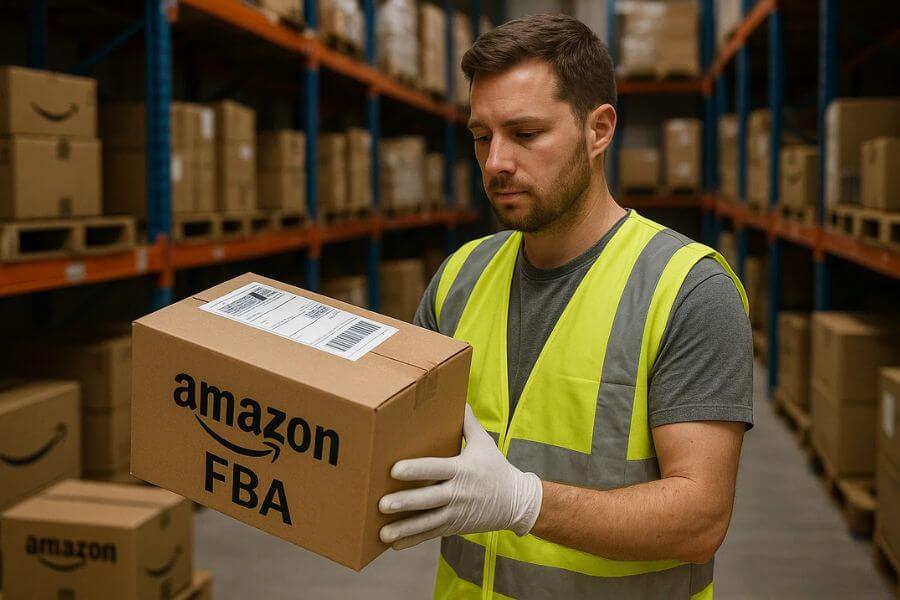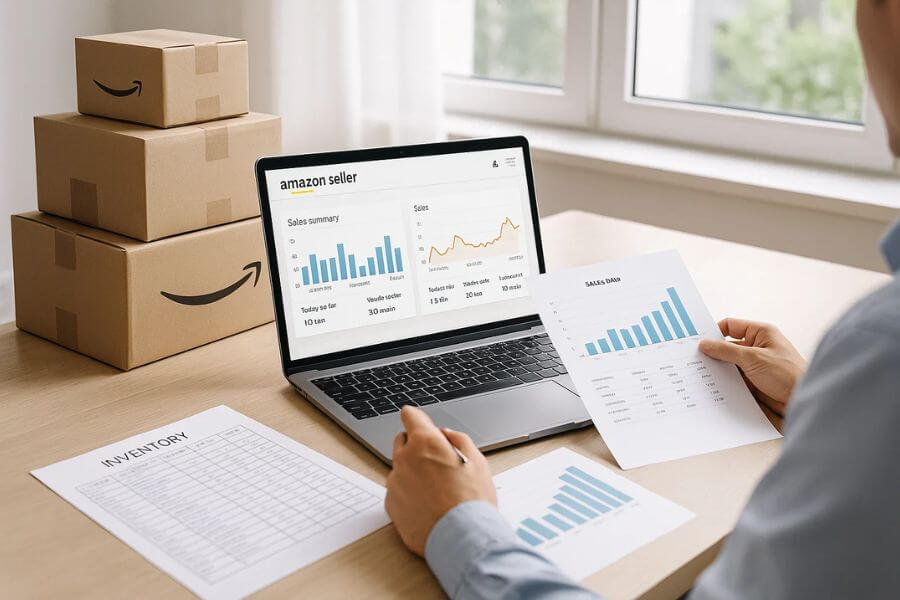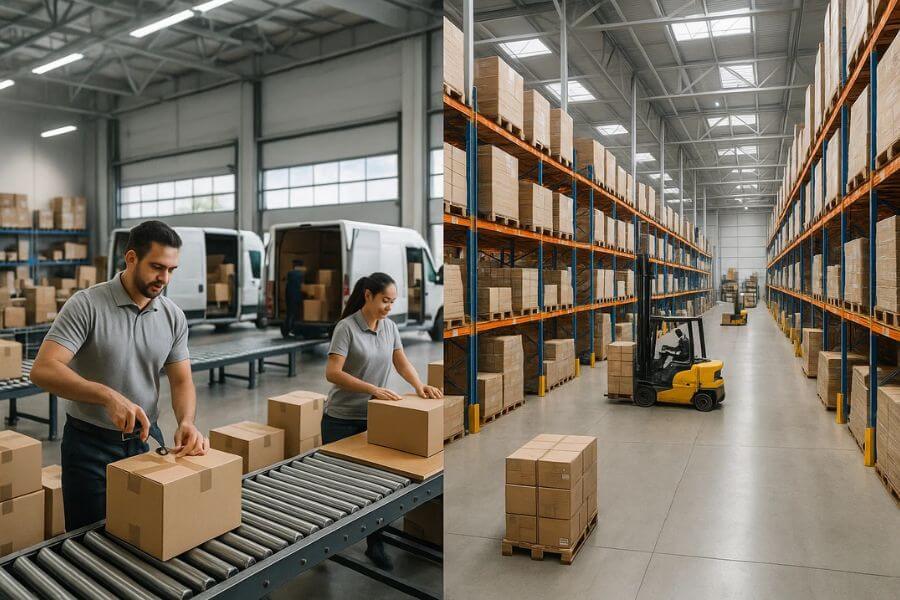The world of ecommerce in 2025 is more competitive than ever. New sellers enter the market daily, customer expectations for faster shipping and better service continue to rise, and global marketplaces are constantly evolving. Amid this fast-paced environment, one service consistently stands out as a growth accelerator for online businesses: Amazon FBA (Fulfillment by Amazon).
Amazon FBA has transformed the way ecommerce sellers operate. Instead of handling storage, packing, shipping, and customer service on their own, sellers can outsource these complex logistics tasks to Amazon. This means fewer headaches, more efficiency, and greater focus on scaling your brand.
But in 2025, the benefits of FBA go even further. With Amazon’s expanded global logistics network, cutting-edge AI-driven inventory management, and improved delivery services like Prime One-Day and Same-Day Delivery, FBA isn’t just convenient—it’s a competitive advantage.
In this article, we’ll explore in detail the 10 biggest benefits of using Amazon FBA for ecommerce sellers in 2025, with insights on how it works, why it’s effective, and how you can maximize it for sustainable growth.
What is Amazon FBA?
Before diving into the benefits, let’s briefly define Amazon FBA.
Amazon FBA (Fulfillment by Amazon) is a logistics and fulfillment service where sellers store their products in Amazon’s warehouses. Once a customer places an order, Amazon handles everything: picking, packing, shipping, customer support, and even returns. Sellers pay storage and fulfillment fees, but in exchange, they gain access to Amazon’s world-class logistics infrastructure.
In 2025, FBA is more robust than ever, with improved features such as:
- Faster delivery times: Amazon has expanded its same-day and next-day delivery options.
- AI-powered inventory management: Helps sellers reduce stockouts and overstock.
- Global fulfillment expansion: Easier access to international markets.
- Seamless integration with multi-channel platforms: Beyond Amazon, you can fulfill orders from Shopify, Walmart, eBay, and more.
Now, let’s break down the top 10 reasons why using Amazon FBA is a game-changer for ecommerce sellers in 2025.
1. Access to Amazon Prime customers
Perhaps the most powerful benefit of using FBA is the ability to tap into Amazon’s massive Prime customer base.
- Prime membership dominance in 2025: Amazon Prime has surpassed 250 million global subscribers, and these members spend significantly more than non-members. Studies show that Prime shoppers spend nearly twice as much annually compared to non-Prime buyers.
- Automatic Prime eligibility: When you list products through FBA, your listings automatically carry the Prime badge. This badge signals fast, free, and reliable shipping—a factor that instantly boosts buyer trust and increases click-through rates.
- Psychological advantage: Many customers filter search results to show only Prime-eligible products. Without the Prime badge, you risk being invisible to this massive customer segment.
In short, using FBA opens the door to higher visibility and greater sales opportunities, simply because your products qualify for Prime. For ecommerce sellers in 2025, this is no longer optional—it’s essential to stay competitive.
2. Fast and reliable shipping
In today’s ecommerce landscape, speed is everything. Shoppers expect quick delivery, and Amazon has raised the bar for everyone.
- Same-day and one-day delivery: With FBA, your customers can benefit from Amazon’s extensive logistics network that offers one-day—and in many cities, same-day—delivery. This is nearly impossible for most independent sellers to achieve on their own.
- Customer trust in Amazon delivery: Shoppers know that Amazon delivers on time. A product backed by Amazon’s logistics system automatically gains credibility.
- Reduced cart abandonment: Studies show that one of the biggest reasons customers abandon carts is long or expensive shipping. With FBA, you eliminate this concern.
For ecommerce sellers, FBA means faster delivery without additional effort. You don’t have to negotiate with couriers, manage shipping logistics, or worry about missed deliveries—Amazon does it all.
3. Reduced operational burden
Running an ecommerce business involves countless moving parts: sourcing products, storing inventory, packaging orders, managing customer inquiries, and handling returns. FBA removes most of these operational challenges.
- No need for a warehouse: Instead of renting or maintaining warehouse space, you can simply ship your products to Amazon’s fulfillment centers.
- Automated order processing: The moment a customer buys your product, Amazon’s system handles everything—from picking items to packaging and shipping.
- Hassle-free returns management: Amazon takes care of returns, refunds, and exchanges, ensuring a smoother experience for customers and fewer headaches for you.
This allows sellers to focus on growth-oriented activities like product research, marketing, and brand development, rather than being bogged down by day-to-day logistics.
4. Global reach with Amazon's network
Expanding internationally is often a major challenge for ecommerce sellers due to customs, duties, and cross-border shipping complexities. FBA makes it easier than ever.
- Amazon Global Selling: With FBA, you can access customers across the U.S., Europe, Asia, and beyond.
- Seamless customs handling: Amazon’s FBA Export program takes care of international shipping and customs duties, so you don’t have to.
- Localized fulfillment centers: In 2025, Amazon has invested in more localized warehouses worldwide, reducing delivery times and shipping costs for international buyers.
For ecommerce sellers, this means selling globally with minimal extra effort. Instead of setting up local operations in each country, you can rely on Amazon’s network to reach new markets.
5. Increased visibility and Buy Box advantage
Winning the Buy Box is one of the most critical factors for success on Amazon. The Buy Box is the “Add to Cart” button on product pages, and the majority of Amazon sales come through it.
- FBA boosts Buy Box eligibility: Since FBA listings are Prime-eligible and backed by Amazon’s fulfillment guarantee, they are more likely to win the Buy Box over self-fulfilled products.
- Improved ranking in search results: Amazon’s algorithm prioritizes listings that offer faster delivery and better customer experience—two core strengths of FBA.
- Higher conversion rates: When your product wins the Buy Box, customers are more likely to purchase, as they don’t need to compare multiple sellers.
For sellers, this translates to greater visibility, higher conversions, and ultimately more sales.
6. Trusted customer service and returns handling
Customer service can make or break your ecommerce business. With FBA, Amazon handles this crucial area for you.
- 24/7 Amazon customer support: Customers can reach Amazon directly instead of contacting you, giving them faster responses and solutions.
- Hassle-free returns: Customers can initiate returns directly through Amazon’s system, and the process is smooth and familiar to them.
- Enhanced buyer confidence: Knowing that Amazon stands behind the purchase gives customers peace of mind, making them more likely to buy.
For sellers, this removes the burden of managing complaints, refunds, and return logistics while ensuring consistent customer satisfaction.
7. Scalability without infrastructure costs
Scaling an ecommerce business often requires investing in more warehouse space, hiring additional staff, and managing complex logistics. FBA eliminates those barriers.
- Amazon’s infrastructure at your disposal: You don’t need to build your own fulfillment network—Amazon’s is ready to scale with your business.
- Pay-as-you-go model: Instead of paying for unused space or staffing costs, you only pay for what you use.
- Easier seasonal scaling: During peak seasons like the holidays or Amazon Prime Day, FBA ensures your products can handle demand surges without operational bottlenecks.
This flexibility means you can grow quickly and sustainably, even if your sales increase suddenly.
8. Cost-effective shipping solutions
Shipping costs are a constant challenge for ecommerce sellers. With FBA, you benefit from Amazon’s scale.
- Amazon’s discounted carrier rates: Amazon negotiates bulk shipping rates with carriers, passing those savings on to FBA sellers.
- Lower per-unit fulfillment costs: Particularly beneficial for lightweight, high-volume products.
- Reduced hidden costs: Without the need to manage warehouses, hire staff, or coordinate logistics, your overall operational costs go down.
Even with FBA fees, many sellers find that the time saved, shipping efficiency, and customer satisfaction outweigh the costs.
9. Multichannel fulfillment (MCF)
Amazon FBA isn’t limited to your Amazon store. With Multi-Channel Fulfillment (MCF), you can use Amazon to fulfill orders from other platforms like Shopify, Walmart, and eBay.
- Centralized inventory management: Keep your stock in one place while fulfilling orders across multiple sales channels.
- Consistent shipping quality: No matter where the customer buys from, they get Amazon’s fast and reliable delivery.
- Streamlined operations: Instead of juggling multiple logistics providers, you can manage everything through Amazon.
For sellers who want to diversify their sales channels, MCF is a powerful tool that ensures efficiency and customer satisfaction.
10. Enhanced brand credibility and trust
Last but not least, using FBA adds a layer of credibility to your brand.
- Fulfilled by Amazon tag: Customers instantly recognize this as a mark of reliability and professionalism.
- Better reviews and ratings: Products fulfilled by Amazon often receive higher ratings due to faster shipping and better customer service.
- Improved brand reputation: Associating your business with Amazon builds trust, especially with new customers unfamiliar with your brand.
This credibility can be the deciding factor in whether a customer chooses your product over a competitor’s.
Conclusion
Absolutely.
Amazon FBA is more than a logistics service—it’s a growth platform for ecommerce sellers. By using FBA, you gain access to Prime customers, global markets, faster shipping, better customer service, and a more scalable business model.
In 2025, where speed, trust, and convenience define ecommerce success, FBA provides the infrastructure and credibility you need to compete with big brands and expand globally.
For sellers looking to grow sustainably and profitably, Amazon FBA remains one of the best decisions you can make.
FAQs about Amazon FBA in 2025
Q1: How much does Amazon FBA cost in 2025?
Costs vary by product size, weight, and storage duration. You’ll pay both fulfillment fees (per unit) and storage fees.
Q2: Is Amazon FBA suitable for small businesses?
Yes. FBA levels the playing field, allowing small sellers to compete with established brands by offering Prime shipping and reliable service.
Q3: Can I use FBA for non-Amazon sales channels?
Yes, through Multi-Channel Fulfillment, you can use Amazon’s logistics to fulfill orders from platforms like Shopify, eBay, and Walmart.
Q4: Do I need to join Amazon Brand Registry to use FBA?
No, but registering adds benefits such as enhanced brand protection, A+ content, and marketing tools.
Q5: Is Amazon FBA still profitable in 2025?
Yes. While fees exist, sellers who optimize product selection, manage inventory efficiently, and leverage Amazon’s global reach find FBA highly profitable.





